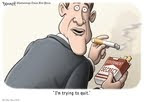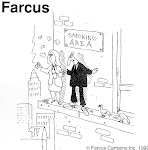
Thursday, November 26, 2009
Happy Thanksgiving ~

Wednesday, November 25, 2009
Cold Turkey Defined ~
 As you prepare you Turkey Dinner for the Holidays here are some thoughts about leftovers ~ or at least thoughts about the term
As you prepare you Turkey Dinner for the Holidays here are some thoughts about leftovers ~ or at least thoughts about the term"Cold Turkey".
There appears to be two acceptable and viable origins of the term;
One being without preparation -- like a left-over turkey dinner. First used as far back as the 1920s in relation to heroin or cocaine addiction. A left over or ‘cold turkey’ dinner is one that requires very little to no preparation - hence, doing something ‘cold turkey’ took on the meaning of actions being taken abruptly … without preparation.
The second most communally accepted origin comes from a reference to a to the physical attributes an addict may take on after stopping a powerful drug such as heroin immediately and abruptly.

When an addict decides to give up heroin with out any sort of support or drug replacement the body has a tendency to react by turning cold and clammy; sweaty and goose bumped much like that which resembles the appearance of a cold, unprepared turkey.
There is a third possibility; that of ‘talking turkey’. To talk turkey with someone is to get down to business straight away … blunt, straight forward speaking. It is plausible that the allusion is to the direct, no nonsense approach of giving up narcotics, alcohol or tobacco indicated by the 'plain speaking' meaning of the term ala Harry Truman.
Monday, November 23, 2009
19 Years Ago ~

Friday, November 20, 2009
Great American Smokeout; American Cancer Society Ad ~
Thursday, November 19, 2009
Great American Smokeout; Going Cold Turkey ~
 If you're a pack-a-day smoker, this means going from 20 to 0 cigarettes in the matter of a day. With the cold turkey method, you completely stop your smoking all at once, relying on your will power to fight your nicotine addiction.
If you're a pack-a-day smoker, this means going from 20 to 0 cigarettes in the matter of a day. With the cold turkey method, you completely stop your smoking all at once, relying on your will power to fight your nicotine addiction.This is the most popular, yet possibly the most uncomfortable, tobacco reduction or cessation strategy. It involves setting a reduction or quit date, and simply reducing or quitting on that date without any prior reduction, preparation or nicotine withdrawal.
The "cold turkey" approach can cause mild to severe nicotine withdrawal symptoms. Drastic reductions in tobacco use will result in withdrawal symptoms that can include irritability, fatigue, headache, insomnia, constipation, sweating, coughing, poor concentration, depression, increased appetite, and cravings for tobacco.
Quitting cold turkey is extremely difficult because most of us have lives that require us to function as somewhat normal human beings for most of the day. When you are suffering through the initial five days of craziness without nicotine, you will feel more like an angry, rabid bear than a human, and you will be about as fit company for other humans. Here are some things you can do to make quitting cold turkey difficult as opposed to impossible:
* Smoke until your last day of work or school, and then begin quitting on the weekend (or whatever days you have off).
* Indulge in other things you like, to the point of foolishness if you feel like it, during the first few days; sleep a lot and watch a lot of TV.
* Avoid situations that frustrate you – you won't deal with frustration very well.
* Avoid any place where people will be smoking.
* Call people whom you know well enough to impose upon and complain to them about how lousy you feel.
* Keep a lot of your favorite non-alcoholic drinks on hand. You will probably feel very thirsty, you'll want to replace the oral gratification of cigarettes with something, and drinking fluids helps to flush the nicotine out of your system faster.
* Have something to do with your hands and/or your mouth. If you like chewing gum, chew it, if you like ripping apart action figures, do so.
* Remember that you're one cigarette away from failure.
These hints apply to some degree to every method of quitting smoking, but if you quit cold turkey you need all the help you can get
Wednesday, November 18, 2009
Tuesday, November 17, 2009
Monday, November 16, 2009
Great American Smokeout; Fast Facts ~

The American Cancer Society first sponsored this event in 1977. On the third Thursday in November of each year, the Great American Smokeout encourages people to stop smoking, even if it is for just one day.
*Held on the third Thursday of November each year.
* 2009 Great American Smokeout: Thursday, November 19th
* Challenge: Quit smoking for 24 hours
* The Great American Smokeout began in Massachusetts in 1971 when a high school guidance counselor asked people to give up cigarettes for a day.
* The idea caught on and the first "D-Day" or "Don't Smoke Day" was held in Minnesota in 1976. * The American Cancer Society began sponsoring the event in 1977.
* By the early 1980s, nearly 16.5 million people participated in the Great American Smokeout.
* Smokers who smoke one pack a day spend about $1,600 a year on cigarettes.
* Use of tobacco products contributed to over 438,000 premature deaths in the U.S. between 1997 and 2001.
* 87 percent of lung cancer deaths are associated with smoking.
* At least 16 types of cancer are associated with smoking.
Friday, November 13, 2009
Great American Smoke Out, 2009 ~
it's almost time and it's the perfect time to set your date and prepare to quit for good!
In an effort to help anyone who desires to quit now I want to encourage you to read and follow my previous post, ~ 11 Steps ~ . This will give you many of the tools you need.
If you want to strip it down to the bare bones there was a post in August, Preparing To Quit: which will break it down to five simple steps, however it all comes down to one real trait -- Commitment.
And for even more encouragement, men may want to read: Do It For Your Penis ~ If that's not encouragement, I'm not sure what else would be.
A good read for both men and women would be Tobacco Facts ~ from September. It's scary that we continue to smoke with all the knowledge we have in today's day and age.
Wednesday, November 11, 2009
Monday, November 9, 2009
Obama's Cigarette Tax Puts the Lie to His No New Taxes Pledge
 By Peter Roff, Thomas Jefferson Street blog
By Peter Roff, Thomas Jefferson Street blogFormer Sen. Russell Long, the Louisiana Democrat who for years headed the powerful Senate Finance Committee, used to say that the strategy for increasing federal revenues was grounded in a time-honored D.C. maxim: "Don't tax you. Don't tax me. Tax that fella' behind the tree."
In essence, what Long was talking about was finding ways to tax "someone else," ideally someone who was not in a position to complain about it much or, even better, exact retribution in the voting booth.
As long as "that fella' behind the tree" had money, it worked as a strategy. Unfortunately for a lot of people, it doesn't work anymore. And it can't, because federal borrowing and spending are, as a percentage of Gross Domestic Product, rising too high.
In just a few months President Obama and a Congress controlled by the Democrats have increased non-defense discretionary spending by 8 percent, and then by an additional 10 percent and then by who knows once Congress finishes with the budget. The national debt, says the non-partisan Congressional Budget Office, will double over the next five years. And triple not too much longer after that.
To balance the books, Obama and the Democrats are going to have to find sources for new revenue—which is the polite way to say "Raise taxes."
This effort to find new revenues should be frustrated by what Obama said was his "firm pledge" not to raise taxes on anyone making less than $250,000.00 a year. "Under my plan," Obama said September 12, 2008 in Dover, N.H., "no family making less than $250,000.00 a year will see any form of tax increase." To emphasize the point he continued, "Not your income taxes, not your payroll tax, not your capital gains taxes, not any of your taxes."
He might have well said, "Read my lips." Like a bad April Fools' Day joke, the federal excise tax on cigarettes increased April 1, 2009 by 156 percent (or 61 cents per pack). And this is a tax that everyone who smokes will pay, despite the fact that, according to the taxpayers' lobby Americans for Tax Reform, one in four smokers live below the poverty line and 55 percent of smokers can be defined as "working poor," which means they make something less than $250,000.00 per year.
For all the talk of "repealing the Bush tax cuts" and "increasing the taxes on the wealthiest Americans," there is just not enough money in that economic cohort—even at tax rates that are confiscator—to pay the bills. But no worries. It is now clear that what Obama said, with apologies to the late Sam Goldwyn, wasn't worth the paper it was printed on.
FJW Note:
(1) the unfair and immoral attack on consumers by this kind of
(a) double taxation &
(b) taxation without representation. (And you know that's true!)
And
(2) should I take a who cares attitude because I don't smoke anymore and possibly it will keep young people off cigarettes.
(Maybe push them more to pot since that will remain affordable.)
Reminds me of the Poem by German Pastor Martin Niemoller (1892–1984) referring to the rise of the Nazis in his homeland.
First they came for the communists, and I did not speak out—because I was not a communist;
Then they came for the socialists, and I did not speak out—because I was not a socialist;
Then they came for the trade unionists, and I did not speak out—because I was not a trade unionist;
Then they came for the Jews, and I did not speak out—because I was not a Jew;
Then they came for me—and there was no one left to speak out for me.
Wednesday, November 4, 2009
Heart attack rates fall 17% after smoking bans enacted
Two separate analyses released Monday each found that heart attack rates fall 17% within a year after smoking bans take effect. One analysis, which included 13 studies, appears in Circulation: Journal of the American Heart Asssociation. A second analysis, which considered 11 studies, appears in the Journal of the American College of Cardiology.
Cigarette smoke can trigger a heart attack in people with underlying heart disease by causing clots or spasms in the blood vessels, says David Goff, a spokesman for the American Heart Association who wasn't involved in either study.
Given that there are about 920,000 heart attacks every year, the studies suggests that public smoking bans could prevent more than 150,000 of these, according to the Cardiology paper.
Taken together, the findings provide strong, consistent evidence that the country should enact more smoke-free laws, Goff says.
"This is a huge, huge effect for a very, very low cost," says Stanton Glantz of the University of California-San Francisco, co-author of the Circulation study.
Smoke-free laws reduce heart attacks in three ways, Glantz says. First, they protect smokers themselves. Second, they protect non-smokers — especially waiters and bartenders — from secondhand smoke. Third, they encourage people to quit or smoke less by making it more difficult for people to find place to light up.
Smoke-free laws have other healthy side effects, says Tom Glynn of the American Cancer Society. They also reduce the risk of lung cancer, although more slowly.
Preventing heart attacks can save money.
Cardiovascular disease costs the country $475.3 billion a year, both in direct costs, such as hospital stays, and indirect costs, such as missed work, Goff says. It costs at least $14,000 to treat one heart attack patient in the hospital, says Goff, who says that cardiac rehab, medication and other care cost even more.
"Really pushing strong smoke-free policies has a huge effect on health care costs by simply avoiding disease," Glantz says.
Thirty-one states now forbid smoking in workplaces, restaurants or bars, according to the American Nonsmokers' Rights Foundation. About one in five adults smoke, according to the Centers for Disease Control and Prevention.
Monday, November 2, 2009
~ A 'Teachable' Moment ~
 If you still need incentives to quit smoking or in some of our cases to stay quit, you could try cancer screening. Knowing that smoking significantly increases your risk for head, neck, and lung cancer may not be incentive enough to make you stop smoking or keep you from picking one up after having quit for any period of time. Discovering that secondhand smoke is freakishly unhealthy for your children, partner, pets or the people in riding in your car may not be the most powerful incentive either. If you're really ready to kick the habit or still fighting urges after quitting, you may want to try something new.
If you still need incentives to quit smoking or in some of our cases to stay quit, you could try cancer screening. Knowing that smoking significantly increases your risk for head, neck, and lung cancer may not be incentive enough to make you stop smoking or keep you from picking one up after having quit for any period of time. Discovering that secondhand smoke is freakishly unhealthy for your children, partner, pets or the people in riding in your car may not be the most powerful incentive either. If you're really ready to kick the habit or still fighting urges after quitting, you may want to try something new.Lung cancer screening
The Mayo Clinic found that lung cancer screening helps some people stop smoking and can be added encouragement for others to never pick up another cigarette. Dr Matthew Clark says, "Our results indicate that people who participate in cancer screening were motivated to quit smoking. Cancer screening may present a 'teachable moment'." (And who couldn’t use more of those??) That is, when people learn how their lungs function and how smoking affects their organs, they may be more motivated to stop or stay stopped smoking.
If patients receive abnormal lung cancer screening results, they're (not surprisingly) even more motivated to quit. The more abnormal lung screenings they receive, the easier it is to quit. Lung cancer is the most preventable cancer; smoking causes 85% of lung cancer diseases.






